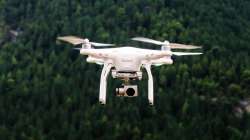Drone delivery at home to get a boost in post Covid era
The Covid-19 pandemic has given a tremendous boost to online delivery platforms and retail drone technology will see a commercial rollout on a larger scale in the not-too-distant future, Indian-origin researchers have stressed.

The Covid-19 pandemic has given a tremendous boost to online delivery platforms and retail drone technology will see a commercial rollout on a larger scale in the not-too-distant future, Indian-origin researchers have stressed.
The study found that both the number of last-mile warehouses and the delivery speed of the drones will increase as technology matures. In other words, last-mile delivery networks will become more decentralised, with drones operating at increasingly faster speeds.
"It would be reasonable to assume that drone technology is maturing quickly. The Covid-19 pandemic will perhaps hasten this process," said Dr Milind Dawande, professor of operations management at The University of Texas at Dallas' Naveen Jindal School of Management.
Hands-free delivery to one's doorstep will be an advantage drones can offer in the post-Covid era. In the new study, published online in Production and Operations Management, three faculty members from Naveen Jindal School of Management explored how drone delivery could change retail logistics networks.
The analysis showed that while perfect customisation of delivery-time guarantees is more profitable, retailers can capture a sizeable portion of the profit by partitioning their market into a few zones and offering the best-possible delivery-time guarantee for each zone.
"If a retailer promises each customer a different delivery time based on the customer's location, that would be perfect customisation," Dawande said.
For example, a retailer could give any customer who is 1.5 km away a delivery-time guarantee of five minutes and a customer 2 kms away a delivery-time guarantee of seven minutes.
"While perfect customisation is theoretically best for the retailer, it is impractical. Instead, the retailer might offer all customers less than 6 kms away a guaranteed delivery time of 15 minutes. In other words, limited customisation is good enough," Dawande explained.
Faster delivery times are more profitable because it implies more demand. The researchers noted that increasing the delivery speed of drones can help improve profitability only if it is accompanied by an increase in the number of last-mile warehouses.
"Therefore, in congested markets, where the number of warehouses cannot be increased, the retailer may find it best to offer a delivery speed that is lower than the highest possible speed," the authors said.
The study co-authors are Dr Ganesh Janakiraman and Dr Vijay Mookerjee. The lead author is former student Sandun Perera who is an assistant professor of managerial sciences at the University of Nevada, Reno. The analysis is also applicable to other dedicated delivery vehicles, such as delivery robots and electric bikes, which many retailers are currently testing.
